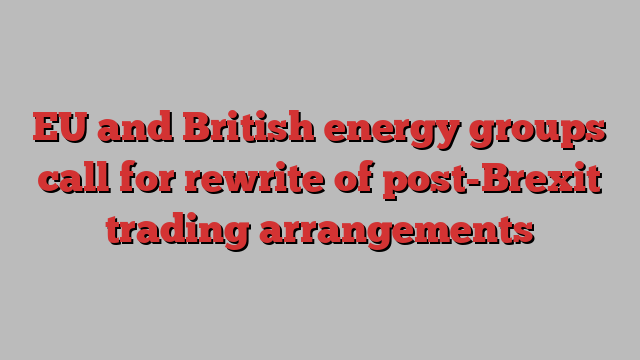
Unlock the Editor’s Digest for free
Roula Khalaf, Editor of the FT, selects her favourite stories in this weekly newsletter.
European and British energy companies have jointly called for the post-Brexit energy trading arrangements between the EU and the UK to be radically rewritten to create a “green energy hub” in the North Sea.
An open letter from 20 leading green energy companies and pressure groups to EU and UK energy ministers warned that the EU-UK Trade and Cooperation Agreement creates a “suboptimal” mechanism for trading electricity.
“We are concerned that the EU and the UK will not achieve their objectives of fully developing the potential of the North Seas as long as electricity is traded using suboptimal market mechanisms,” they wrote.
The signatories, including leading EU interconnector companies and the UK’s National Grid, warned that energy trading provisions in the TCA risk creating uncertainty that “impedes investment”, which both sides need to hit ambitious green energy targets.
UK and EU leaders have promised a “reset” of relations in the coming years, with the UK Prime Minister Sir Keir Starmer visiting Brussels this month to meet EU commission president Ursula von der Leyen to signal formally the start of a rapprochement.
A joint statement between the two sides on October 2 promised to forge a new strategic partnership, including working together on “climate change and energy prices” despite apparent disagreements over other areas, such as youth mobility.
At the point of Brexit, the UK left the EU single market, including its internal energy market which allows electricity to be traded efficiently across the bloc, helping to provide certainty to investors in alternative energy.
A complex pricing mechanism, known as multi-region loose volume coupling (MRLVC) was included in the TCA but has never come into force because of technical challenges in implementing the scheme.
The North Sea, one of Britain’s best sources of consistent offshore wind, is increasingly seen as a critical energy resource for both the UK and the EU, with the bloc pushing to increase vastly its use of renewable power to replace Russian fossil fuel supplies.
Kristian Ruby, secretary-general of the EU electricity industry body Eurelectric, described the North Sea as “a mega power plant that will supply both continental Europe and the British Isles”.
He added that it was “time to move on from Brexit minimalism and explore mutually beneficial co-operation arrangements between the UK and the EU”.
In April 2023, the UK joined eight other northern European countries, including France and Norway in signing up to the Ostend Declaration committing to deliver 300 gigawatts of offshore wind by 2050 — more than doubling output in the two decades from 2030.
Adam Berman, a deputy director at industry lobbyist Energy UK, which also signed the letter, said it was clear the post-Brexit electricity trading arrangements were “not fit for purpose” and put EU and UK ambitions for the North Sea “at risk”.
He added that a “new approach” was needed to ensure that both sides could benefit from the “clean energy infrastructure that will power a net zero economy”.
Giles Dickson, chief executive of the industry body WindEurope, said the “lack of clarity” on post-Brexit electricity trading rules was holding up offshore wind energy investment in the North Sea.
“Energy producers and grid operators in the EU and UK are in full agreement on how to solve this,” he said.
Industry experts said the current trading system was highly inefficient and reflected the bloc’s previous concerns that the UK should not be allowed to cherry-pick access to the EU single market.
However, the solution proposed by the letter’s signatories was to extend the EU’s price-coupling mechanism to the GB market, a step they said could be achieved without reopening the TCA — something both sides have said they do not wish to do.
“We call upon both sides of the seas to seize the opportunity to overcome the past political impasse following the UK’s withdrawal from the EU and to open up for a new phase that allows mutual benefits to be secured via a pragmatic approach,” they added.
The European Commission said it was “committed to implement what is foreseen in the TCA”, which included the MRLVC trading arrangements.
But it admitted that the application of these arrangements had “proven to be more challenging than initially thought” and that a recommendation for further analysis of the mechanism should be adopted by the end of 2024.